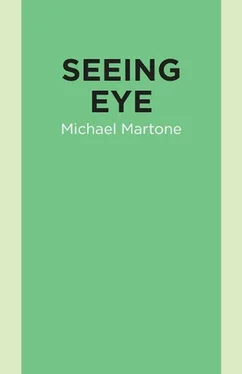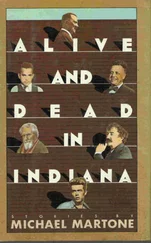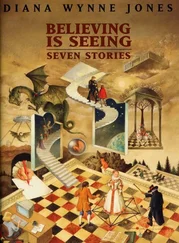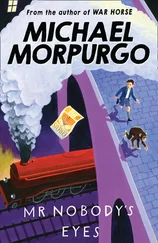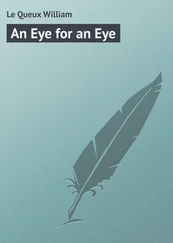Michael Martone - Seeing Eye
Здесь есть возможность читать онлайн «Michael Martone - Seeing Eye» весь текст электронной книги совершенно бесплатно (целиком полную версию без сокращений). В некоторых случаях можно слушать аудио, скачать через торрент в формате fb2 и присутствует краткое содержание. Год выпуска: 2013, Издательство: Dzanc Books, Жанр: Современная проза, на английском языке. Описание произведения, (предисловие) а так же отзывы посетителей доступны на портале библиотеки ЛибКат.
- Название:Seeing Eye
- Автор:
- Издательство:Dzanc Books
- Жанр:
- Год:2013
- ISBN:нет данных
- Рейтинг книги:5 / 5. Голосов: 1
-
Избранное:Добавить в избранное
- Отзывы:
-
Ваша оценка:
- 100
- 1
- 2
- 3
- 4
- 5
Seeing Eye: краткое содержание, описание и аннотация
Предлагаем к чтению аннотацию, описание, краткое содержание или предисловие (зависит от того, что написал сам автор книги «Seeing Eye»). Если вы не нашли необходимую информацию о книге — напишите в комментариях, мы постараемся отыскать её.
Seeing Eye — читать онлайн бесплатно полную книгу (весь текст) целиком
Ниже представлен текст книги, разбитый по страницам. Система сохранения места последней прочитанной страницы, позволяет с удобством читать онлайн бесплатно книгу «Seeing Eye», без необходимости каждый раз заново искать на чём Вы остановились. Поставьте закладку, и сможете в любой момент перейти на страницу, на которой закончили чтение.
Интервал:
Закладка:
What I did all at once, swimmers now watch in pieces.
Doc could never get the pieces fine enough. Two pictures that looked identical to me looked years apart to him. They were a slice of a second apart. Like that puzzle in children’s magazines where the quintuplets are really twins and three are impostors.
He no longer recognizes me now that I am not in college.
They say one day Doc was surprised by his own picture in a recent team portrait.
I remember the lights on my fingers and toes. I remember the batteries on my back.
There is this bar in Bloomington, Nick’s, we would go to after practice in the morning. After telling Doc that we had a class to go to. We’d make our way down Kirkwood against the flow of students heading toward the old campus and their first class of the day. As they would close in behind us we would hear them say, “Swimmers.”
Swimmers.
Nobody ever called me by name.
Sitting at the bar, we could look out to the street and the students heading east. Across the street they were building a little mall on the corner of Dunn. Bloomington looked like Indiana then. It probably looks like California now. The stone replaced by redwood, outdoor cafes where the bars with neon signs had been. And roller skaters gliding to school instead of townies leaning into the wind.
The windows at Nick’s were painted over with diagonal panes to make it look English. So we saw all this through diamonds.
You drank your beer from old jars.
They sold beer by the pound at Nick’s.
She misses the interviews.
Plimpton was the last, four years after all the wins.
We showed him around, ran the tapes and films.
He was interested in what I was going to do now. I told him I was going to be a dentist, and he didn’t believe me. I could live on the razor money, he said, sell goggles.
“You could pretend to be a dentist, George,” she said, “and come to the office.” On the televised interviews she sees now, she watches the wives and girlfriends, how they kiss and hold on to the men who are talking. She likes the ones who never look at the camera but stare up at the men.
I ask my patients questions while we wait for the blocks to take. If their mouths aren’t full of cotton, they try to answer. It is hard to talk when half your face is numb. Lips and tongue and jaw are disappearing. I answer the questions for them as they nod their heads.
I keep them in a lockbox at the bank. What can you do with them? I read somewhere in my textbooks about the place in the body that stores gold salts. Like the thyroid and iodine. If you suspect a lesion, you administer some radioactive salts and watch the iodine coat the throat. You need just a little bit of iodine. The same with gold. There is always a bit in the brain. That is where it concentrates, in the thalamus, the seat of emotion. I think about this when I am flushing out a filling, filing it down. There are shavings on the back of the tongue. In the brain, too, a little cavity, a missing piece. If the iodine is not there, you go all puffy. I don’t remember what happens if you are deficient of gold. Sad, I guess.
I think of the medals on my chest, pure and heavy. You could bend them and rub off a mark like the crayon color of gold. Not like the metals I mix now — the silver amalgam. Silver expanding, the tin contracting, the copper’s strength, and the zinc for flow. All mixed with mercury. Not like gold. Gold is perfect. Gold does not discolor if kept clean. It resists crushing stress. It keeps an edge. It will not fracture.
I think about my medals in the bank vault. Perhaps, if times get tough, I will have them flattened into foil and rolled for the pellets I need.
Could I ever drown? Could I ever forget that much? Is it really like breathing? I am like the cartoon character who has walked over a cliff and hasn’t looked down yet.
I watch all the cartoons on Saturday so I can discuss them with my patients. To drown would be the only death that would make sense. The thing that makes you, kills you. The thing that serves you right. The hunting accident for the hunter. But I wonder if I could let myself or if the water wouldn’t toss me back. No, it won’t be the water that I’ll drown in, it will be the swimming.
Someone has colored in Goofus and Gallant. Blue and red faces. You should hold the gate open for your little brother. You should help him find his shoe .
I have found all the hidden pictures in the Hidden Pictures and have circled them all with purple Crayola.
Bobby has yet to show up.
This is a nice life — being here, the crayons, the teeth in my pocket, Suzy home.
It’s Time
I remember the time each year when my husband cut back the raspberry bushes. I always thought he took too much, afterwards a row of whittled spikes where once a tangled mass of brambles boiled along the fence. He ripped out the dead canes altogether, brittle straws, pruned the branches down to nothing. He dug up the newly rooted tips where last year’s growth had bowed over to the ground and took hold, the first long stride into the garden. Every spring, I believed they would never grow back, but in a few weeks, with the days lengthening, the stubby canes streaked with red, budded, shot up overnight.
Does it count as a first word? The other raspberry, the sound my daughter made, her tongue melting into slobber between her lips, stirring before dawn in the tiny bedroom down the hall. It was dark, and the wet blasts helped me navigate, the floors covered with her blocks and toys. Her room was pitch black, the only light the daubs of radium I swiped from the factory outlining the rails and bars of her crib. At night it looked like a bridge lit up, suspended over the varnished surface of a wide, still river. The paint had dripped on the floor, formed a tiny drifting phosphorescent slick. My daughter tottered about. I could see only her shadow, her shape blotting out the dew of pulsing light behind her. She sprayed her one-note greeting. When I picked her up, her tongue rasped next to my ear. I felt her whole body going into the sound, her breath dying down, her spit a mist on my cheek.
“Don’t go,” my husband had said. “Stay in bed. She’s not crying. Ten minutes more. Let her go.”
I could see he was looking at the time. I watched the luminous dial of his watch float up off the nightstand. The little wedge the hands made rotated as he fumbled to right the face. From eleven o’clock the time spun to a little past five thirty. “She’s up early,” I heard him say. The little constellation spiraled back to the table.
Often there were flecks of paint in my hair. He said he could always find me in the dark. He’d kiss me through a cloud of stars. I’d shake my head and the sparks would spill down onto the pillow, sprinkling his face. My fingertips too lit up, stained where I held the brush and the tiny pot. I became distracted with my own caresses, streaks of light tracing his back, neck, hips. Flakes of light caught in the hairs on his chest and eyebrows, blinked on and off as he opened and closed his eyes. Where I kissed him I left welts of throbbing light. His lips grew brighter. It seemed like the fire should die out but it didn’t, would only disappear with the dawn in the windows. We could see everything then and still hear our daughter down the hall cooing to herself, inventing a language to call me to her.
This was in Orange right after the war. They used women at the factory there to paint the clocks. Our hands were steady. We were patient, perfect for the delicate trimming, outlining the numerals with the radium, down to the marks on the sweep face, sketching hairlines on the minute hand. I had sable brushes I rolled on my tongue to hone a point sharp enough to jewel each second. The paint was sweet and thick like a frosting laced with a fruity essence. We’d thin it with our spit. Rich and heavy like the loam in the garden. It was piecework. At the long tables we’d race through the piles of parts, my hands brushing the other hands, reaching in for the next face or stem. The room was noisy. Alvina sang to herself. Blanche reeled off recipes. Marcella clucked. We talked with our eyes crossed over our work, “She had to get married. They went to Havre de Grace by train and were back by noon the next day.” We paused after each sentence or verse as we dabbed the brushes to our lips. It was as if our voices came from somewhere else. I’d look away, out the huge windows to the brilliant sky. I can still hear the buzz above the table as something separate from the people there, another kind of radiation in the room that never seemed to burn out. The stories and the songs blend into one ache.
Читать дальшеИнтервал:
Закладка:
Похожие книги на «Seeing Eye»
Представляем Вашему вниманию похожие книги на «Seeing Eye» списком для выбора. Мы отобрали схожую по названию и смыслу литературу в надежде предоставить читателям больше вариантов отыскать новые, интересные, ещё непрочитанные произведения.
Обсуждение, отзывы о книге «Seeing Eye» и просто собственные мнения читателей. Оставьте ваши комментарии, напишите, что Вы думаете о произведении, его смысле или главных героях. Укажите что конкретно понравилось, а что нет, и почему Вы так считаете.
